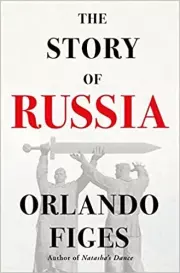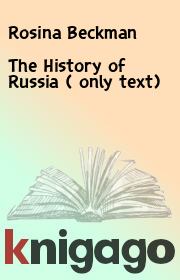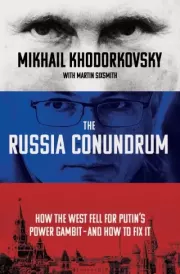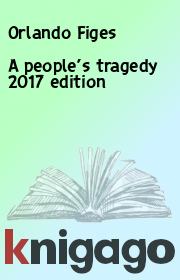Orlando Figes - The Story of Russia
 | Название: | The Story of Russia |
Автор: | Orlando Figes | |
Жанр: | Старинная литература | |
Изадано в серии: | неизвестно | |
Издательство: | неизвестно | |
Год издания: | 2022 | |
ISBN: | неизвестно | |
Отзывы: | Комментировать | |
Рейтинг: | ||
Поделись книгой с друзьями! Помощь сайту: донат на оплату сервера | ||
Краткое содержание книги "The Story of Russia"
“This is the essential backstory, the history book that you need if you want to understand modern Russia and its wars with Ukraine, with its neighbors, with America, and with the West.”
―Anne Applebaum, author of Twilight of Democracy and Red Famine
Named a Most Anticipated Book of the Year by Publishers Weekly and Kirkus Reviews
From “the great storyteller of Russian history” (Financial Times), a brilliant account of the national mythologies and imperial ideologies that have shaped Russia’s past and politics―essential reading for understanding the country today
The Story of Russia is a fresh approach to the thousand years of Russia’s history, concerned as much with the ideas that have shaped how Russians think about their past as it is with the events and personalities comprising it. No other country has reimagined its own story so often, in a perpetual effort to stay in step with the shifts of ruling ideologies.
From the founding of Kievan Rus in the first millennium to Putin’s war against Ukraine, Orlando Figes explores the ideas that have guided Russia’s actions throughout its long and troubled existence. Whether he's describing the crowning of Ivan the Terrible in a candlelit cathedral or the dramatic upheaval of the peasant revolution, he reveals the impulses, often unappreciated or misunderstood by foreigners, that have driven Russian history: the medieval myth of Mother Russia’s holy mission to the world; the imperial tendency toward autocratic rule; the popular belief in a paternal tsar dispensing truth and justice; the cult of sacrifice rooted in the idea of the “Russian soul”; and always, the nationalist myth of Russia’s unjust treatment by the West.
How the Russians came to tell their story and to revise it so often as they went along is not only a vital aspect of their history; it is also our best means of understanding how the country thinks and acts today. Based on a lifetime of scholarship and enthrallingly written, The Story of Russia is quintessential Figes: sweeping, revelatory, and masterful.
Читаем онлайн "The Story of Russia". [Страница - 2]
- 1
- 2
- 3
- 4
- . . .
- последняя (101) »
‘Who controls the past … controls the future: who controls the present controls the past,’ George Orwell wrote in Nineteen EightyFour.5 The maxim is more true for Russia than for any other country in the world. In Soviet times, when Communism was its certain destiny and history was adjusted to reflect that end, there was a joke, which perhaps Orwell had in mind: ‘Russia is a country with a certain future; it is only its past that is unpredictable.’
No other country has reimagined its own past so frequently; none has a history so subjected to the vicissitudes of ruling ideologies. History in Russia is political. Drawing lessons from the country’s past has always been the most effective way to win an argument about future directions and policies. All the great debates about the country’s character and destiny have been framed by questions about history. The controversy between the Westernisers and the Slavophiles, which dominated Russia’s intellectual life in the nineteenth century, came down to a conflict over history. For those who looked to the West for their inspiration, Russia had been strengthened by the Westernising reforms introduced by Peter the Great in the early eighteenth century; but according to the Slavophiles, Russia’s native culture and traditions, its national cohesion, had been undermined by Peter’s imposition of alien Western ways on the Russians.
Today the role of history in such debates is more important than ever. In Putin’s system, where there are no left–right party divisions, no competing ideologies to frame debate, and no publicly agreed meanings for key concepts like ‘democracy’ or ‘freedom’, the discourse of politics is defined by ideas of the country’s past. Once the regime lays its meaning on an episode from Russian history, that subject is politicised. This is nothing new. Soviet historians were even more the hostages to changes in the Party Line, particularly under Stalin, when history was falsified to elevate his own significance and discredit his rivals. Some were forced to ‘correct’ their work, while others had their works removed from libraries or were banned from publishing again.
Even before 1917, history was carefully censored. It was a question not just of preventing the publication of ideas and facts that could be politically dangerous (anything that portrayed the autocracy unfavourably) but of making sure that the official story of the country’s past was not undermined in a way that challenged current policies. Ukrainian historians were particularly closely watched because of their presumed sympathy for European principles. They were not allowed to publish in Ukrainian, encourage nationalist feelings for Ukraine, or to promote a sense of grievance against Russia.6
Beyond such controlling narratives, history-writing in Russia, since its beginning in medieval chronicles, has been intertwined in mythical ideas – the myths of ‘Holy Russia’, the ‘holy tsar’, the ‘Russian soul’, Moscow as the ‘Third Rome’ and so on. These myths became fundamental to the Russians’ understanding of their history and national character. They have often guided – and misguided – Western policies and attitudes towards Russia. To understand contemporary Russia we need to unpack these myths, explain their historical development and explore how they informed that country’s actions and identity.
The great cultural historian of Russian myths, Michael Cherniavsky, proffered a persuasive explanation for their extraordinary power and resilience over many centuries:
It has been observed by many that myths, rather than approximating reality, tend to be in direct contradiction to it. And Russian reality was ‘unholy’ enough to have produced the ‘holiest’ myths of them all. The greater the power of the government, the more extreme was the myth required to justify it and excuse submission to it; the greater the misery of the Russian people, the more extreme was the eschatological jump the myth had to provide so as to justify the misery and transcend it.7
Many writers have observed the Russian people’s need for transcendental myths promising a better version of Russia. In Dostoevsky’s novels, where suffering and salvation are such frequent themes, it appears as the essence of the Russian character. The endurance of these myths explains much in Russia’s history: the lasting force of Orthodox beliefs; the people’s search for a holy tsar, the embodiment of their ideals, to deliver them from injustice; their dreams of building heaven on this earth, a revolutionary utopia, even when this dream turned out to be the nightmare of the Stalinist regime.
All of which is to explain why this book is called The Story of Russia. It is as much about the ideas, myths and ideologies that have shaped the country’s history, about the ways the Russians have interpreted their past, as it is about the events, institutions, social groups, artists, thinkers and leaders that have made that history.
The book begins in the first millennium, when Russia’s lands were settled by the Slavs, and ends with Putin, in the third, examining the myths of Russian history which he has used to bolster his authoritarian regime. Its underlying argument is simply put: Russia is a country held together by ideas rooted in its distant past, histories continuously reconfigured and repurposed to suit its present needs and reimagine its future. How the Russians came to tell their story – and to reinvent it as they went along – is a vital aspect of their history. It is the underlying framework of this history.
The cult of the grand prince Vladimir, ‘Equal of the Apostles’, as he’s called, is an illustration of this reinvention of the past. Almost nothing about him is known. There are no contemporary documents, only later chronicles by monks, hagiographic legends of his conversion, which served as a sacred myth legitimising his descendants, the rulers of Kievan Rus. Vladimir was one of many princes to be made a saint in the medieval period. But it was only later, from the sixteenth century, that his cult assumed a more important status, when Ivan IV (‘the Terrible’) promoted it as the basis of his bogus claim, as Moscow’s tsar, to be the sole legitimate successor to the Kievan rulers and the emperors of Byzantium. The myth was used as part of Russia’s struggle against Poland and Lithuania, which possessed parts of what had once been Kievan Rus. From Ivan’s reign, Vladimir was hailed as ‘the first Russian tsar’, the holy ‘gatherer of the Russian lands’, in a legendary narrative whose purpose was to trace the roots of Moscow’s growing empire to Kievan Rus and Byzantium as its sacred foundations.8
This foundation myth was fundamental to the Romanovs, who had no descendance from the Kievan princes on which to base their fragile
--">- 1
- 2
- 3
- 4
- . . .
- последняя (101) »
Книги схожие с «The Story of Russia» по жанру, серии, автору или названию:
 |
| Rosina Beckman - The History of Russia ( only text) Жанр: Старинная литература Год издания: 101 |
| Encyclopaedia Britannica - Russia Жанр: Старинная литература Год издания: 101 |
 |
| Mikhail Khodorkovsky-ua - The Russia Conundrum - Mikhail Khodorkovsky-ua Жанр: Старинная литература Год издания: 2022 |
 |
| Orlando Figes - A people's tragedy 2017 edition Жанр: Старинная литература Год издания: 101 |


